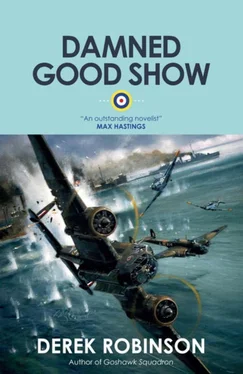After a while, with engines all along dispersal joining in, Rollo asked Silk why he wasn’t starting-up.
“Dog’s last in the queue. I’m not going to waste fuel and risk overheating the engines.”
“Last? I thought everyone took off in alphabetical order.”
“We’re carrying the cookie. The four-thousand-pounder. It makes sense for us to go last.” He stretched and yawned. “Pug Duff would never speak to me again if Dog fell on her face halfway down the flare-path and ruined the grass.” He strolled away.
Rollo went to Kate. She was bundled up in flying gear, all of it scrounged by Silk, and the warmth had made her drowsy. “Wake up,” he said. How could she sleep at a time like this? “We’re carrying the cookie. It’s a bomb as big as a bus.”
“I know. Micky Mallaby told me.”
He found the second pilot admiring the sunset. “This cookie we’ve got on board,” he said. “Why hasn’t everyone got one?”
“Most of the Wimpys haven’t been adapted yet. Their bomb-bays aren’t big enough. Haven’t you seen a cookie? It looks like two big dustbins welded together, end to end.”
“I should have been told. I could have filmed it.”
“Dunno anything about that, mate. Ask Woody. He’s got to drop the bloody thing.”
The crew were drifting toward the bomber. Rollo, now beginning to be excited by the news, intercepted Woodman. “This cookie will make a hell of a bang, won’t it?” he asked. “I mean to say, four thousand pounds of TNT, that’ll blow the railway station to bits, won’t it?”
“If we hit it. A cookie’s not a real bomb. It hasn’t got a tail. It’s got the ballistic properties of a brick shit-house. Might go anywhere. I’ll be pleased if it lands within a mile of the AP.”
Rollo was discouraged, but not for long. When he was sitting next to Kate, behind the main spar, and D-Dog was taxying along the perimeter track, he said: “If I can catch this cookie when it explodes, we could have the perfect climax. It’ll look like the crack of doom.” He was so excited that he forgot to clench his toes when Silk took Dog roaring down the flare-path and, creaking and groaning under its load, into the early night.
6
There was still some light at four thousand. Rollo leaned into the cockpit and filmed Silk flying Dog. He shot the shimmer of a prop disc and changed focus to get the English coastline, far below. He thought the surf looked like toothpaste and the sea looked like oilskin. Black oilskin. Ten seconds of that was plenty.
Kate was taking a feed from the intercom and playing it straight onto the soundtrack. Rollo persuaded Silk and Mallory to say something technical, so they exchanged a few words about keeping an eye on the cylinder-head temperatures. When they finished, the nav gave Silk a new course: eighty-four degrees. Silk did something to the compass, and told everyone to watch out for night fighters. Rollo was pleased. It all added up to a nice little sequence: D-Dog, off to war.
He had seen the map; he knew that crossing the North Sea would take about two hours. No point in carrying a heavy camera all that way, so he put it in its bag. Already his knees ached slightly, from constant bending in order to soften the bumps and dips of flying. D-Dog was not a perfect platform for a cameraman.
At six thousand, and still climbing, Silk switched on the autopilot. Rollo took great interest. Outside, it was night; the only light in the cockpit came from the dials and gauges, a dim green glow, not enough to let him shoot this scene. Some other time, he thought.
Silk kept his hands on his thighs, and he never stopped checking the instrument panel. “This is just testing,” he told Rollo. “I don’t trust George. George is a treacherous bastard. He’s liable to go haywire, and then if you don’t disengage him fast, he’ll kill you. That’s why we keep a fire ax here.” He pointed to the ax, at the second pilot’s side.
“If George gets the hump, I chop through his hydraulics,” Mallaby said. “Cut his bloody head off.”
“Crikey,” Rollo said. It seemed a feeble comment.
He watched the wheel on the control column turn an inch or so, one way or the other. Sometimes the stick wandered back and forth. The rudder bar was rarely still. “George is a bit restless, isn’t he?” he asked.
“No, that’s Dog. She’s a typical Wimpy, always bending and stretching. It affects the control runs. That’s the cables going out to the wings and back to the tail. Dog twists, the controls move, George corrects. Busy man, George.”
“It’s what makes the Wimpy so tough,” Mallaby said. “She’s all basket-weave. Alloy basketweave. The strength is in the shape. You can’t break her back because she hasn’t got a spine. Bloody clever.”
“But she does fidget,” Silk said. “Isn’t that right, Chubby?”
“Right, Skip,” the rear gunner said. “She likes to wag her tail.”
“She does it to keep you awake.”
“It’s like a fairground ride back here.”
“Chubby’s always on the qui vive ,” Silk said to Rollo. “I know because every time he rotates his turret, his guns act as a little rudder and Dog does a little shimmy. And that’s enough of George.” He disengaged the autopilot. “I haven’t got time to do that if we get jumped by a Hun.”
Rollo watched his face. Silk’s eyes were always moving. He had a routine: he looked at the compass; then at the airspeed indicator; at the horizon; at the moon, which was just rising; at the sea; at other instruments, oil pressures, maybe, or fuel gauges, or engine temperatures; then back to the compass again. An endless check. And the op had only just begun. Rollo felt tired. He went back to the rest bed and sat beside Kate. All the interior lights had been dimmed until they were soft sparks in the dark. That must be how Silk wanted it.
He put his mouth close to her ear and shouted: “I could do with some coffee.”
She shouted back: “No coffee until we reach the North Sea on the way home. Otherwise—bad luck.”
Bloody hell , he thought. Already she knows more than me. Soon they climbed above eight thousand and everyone was on oxygen and the camera crew had nothing to do but look at the blackness and endure the bumps and shudders and the taste of wet rubber.
7
Group Captain Rafferty had a good dinner: brown Windsor soup, lamb stew with roast potatoes and leeks, apple pie and custard. He knew it was going to be a long night. Rafferty had a big body; it needed plenty of fuel. He had a second helping of apple pie.
409 Squadron would still be outward bound, over the North Sea. Rafferty left the Mess and looked at the weather. Ten thousand stars and not one wisp of mist. Good. Don’t let me down tonight , he told the sky, not with a maximum effort in the air . Somewhere near Hanover, five hundred miles away, his opposite number in a Luftwaffe night fighter base was probably looking at the same stars and having similar thoughts. Well, you started it, chum , Rafferty told him. Now watch Bomber Command finish it. From the corner of his eye he glimpsed a shooting star come and go so fast that if you blinked, you missed it. Rafferty wasn’t a poetic man but he thought he’d witnessed something symbolic, if only he could put words to it.
No, that was hopeless. He went indoors and found the adjutant. They went to a quiet corner of the anteroom and played drafts for a shilling a game. Uncle was good at drafts. Not slapdash, but he didn’t brood either. Made his move, liked to attack. Rafferty approved of that. He lost seven shillings, fought back and was a shilling up, and then they decided to have a coffee break. “Bring some for Mr. Skelton too,” Rafferty told the Mess servant. To Uncle he said, “He’s been waiting nearly an hour for us to finish playing. Too well-mannered to interrupt, of course. My compliments to Mr. Skelton,” he said to the servant, “and would he be so kind as to join us.”
Читать дальше












